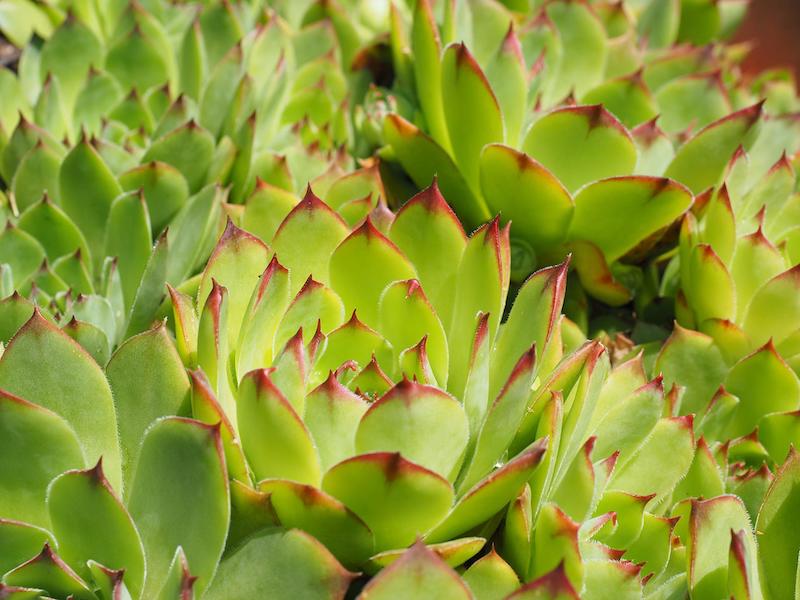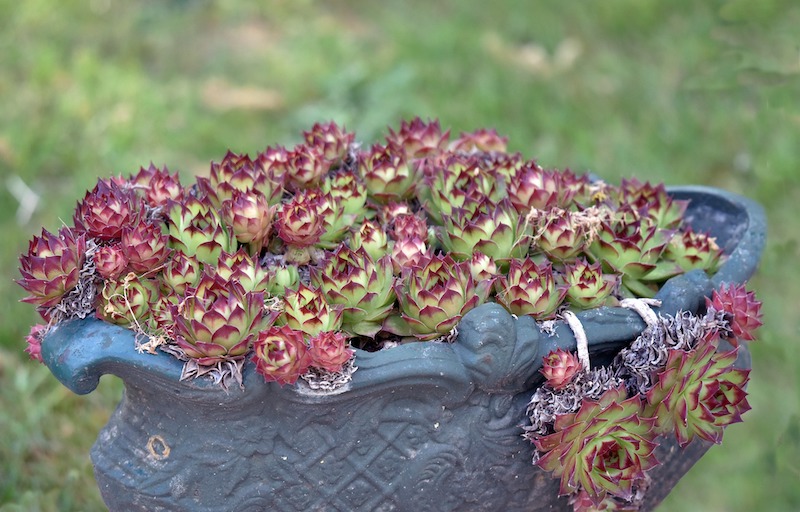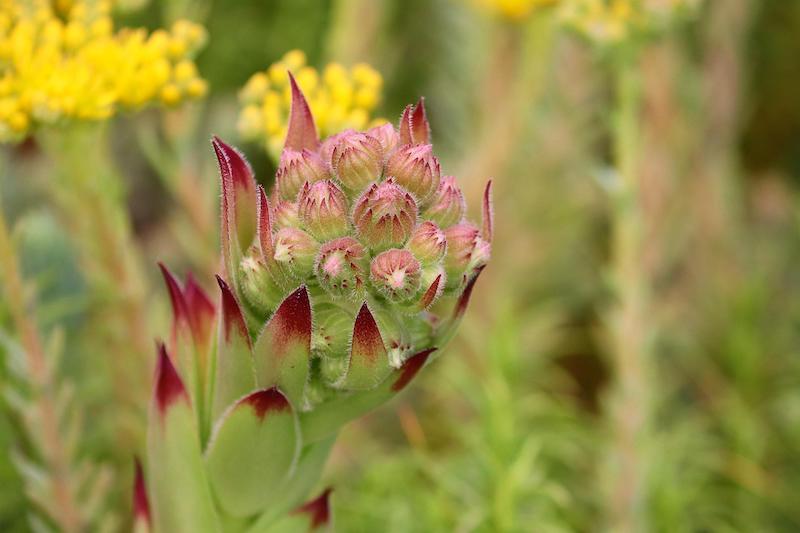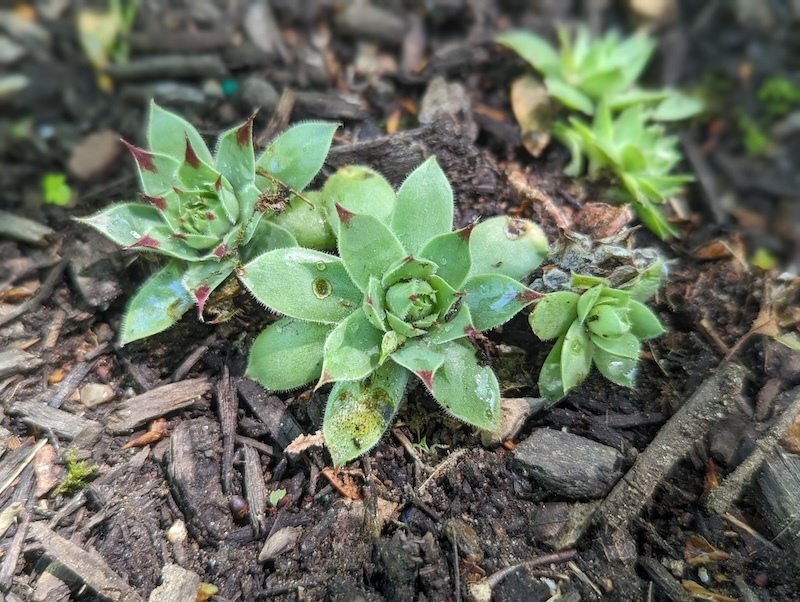Hens and Chicks are a member of the succulent group. More accurately, they’re named Sempervivum tectorum. Hens and chicks are named as such because many babies are produced from the mother plant. Much like other succulents, hens and chicks require very little water and can survive in less than ideal soil conditions. This succulent is relatively low maintenance and easy to care for. It can thrive in cool temperatures, with the ability to go dormant if the temperature is too cool. They are winter hardy in zones 3-8.

Planting Hens and Chicks
Hens and chicks should be planted in well-drained soil. This can be a gritty texture, with a mix of rock and soil, allowing for excellent drainage. These succulents can be planted at any time if kept inside the house, but should be planted during the warm season if planting outside the house. They should be established in the ground before winter hits, and they have a chance to harden off.
Hens and chicks prefer full sun. After finding a spot with good drainage, dig a hole one to three inches deep for the hen. Place the hen in the hole with roots facing downward. Once finished, pack soil around the hen to ensure it is covered. Chicks can be placed directly on top of the soil. Finally, cover the soil entirely with gravel, and water the soil, but not the leaves of the plant.

Watering Hens and Chicks
As with many succulents, watering hens and chicks should be done infrequently. When the soil is damp, watering should be avoided. About once a week, water when the soil is dry. This is more easily monitored inside, and if the hens and chicks are planted outside, wait several days after rain before considering adding water. It’s best to avoid the leaves if possible to reduce the risk of fungal diseases. Keep in mind that well-drained soil within a pot will require more watering than hens and chicks planted directly within the ground.
Fertilizing Hens and Chicks
Hens and chicks are adaptable and can survive in harsh conditions. Fertilization isn’t absolutely necessary, but may promote faster growth. It’s recommended to wait until hens and chicks are established before fertilization. Once plants are established, a 20-20-20 NPK fertilizer can be used at quarter strength once every other month if desired. A 20-20-20 ratio means this fertilizer will contain equal parts nitrogen, phosphorus, and potassium for balanced nutrition. If planted outside, fertilizing should not be done in the winter when plants are dormant.
Pruning Hens and Chicks
Generally, once a hen rosette has bloomed, it can be clipped from the plant. This is typically the only reason to prune this succulent. The pruning is not critical, as the flowering stem can be left to die and fall off on its own. Another form of “pruning” though not necessary, could be done in the form of propagating a leaf in order to form a new plant. This can be done simply by removing the leaf and repotting it in its own pot or area of the garden.

Caring For Hens and Chicks in Pots
Hens and chicks are very versatile in nature and can be planted outside or in, given their winter hardiness. If choosing to plant this succulent in a container, it’s important to create the right soil environment. A general good practice is to mix the soil with gravel in order to increase the drainage within the pot. Like many potted plants, the containers will be prone to drying out quickly. However, since hens and chicks are a part of the succulent family, they can tolerate dry periods. Supplemental watering should only be done about once a week, or when the soil is sufficiently dry.

Winter Care for Hens and Chicks
Hens and chicks are winter hardy in zones 3-8. As such, they generally don’t require care over the winter as they enter a dormant stage. Pruning doesn’t have to wait until the winter either, as it’s generally done once flowers have bloomed or when propagating. During the winter, if hens and chicks are outside, they’ll likely remain low maintenance. They will only need water during a long stretch of dry weather. Otherwise, exposure to snow and rain throughout the winter will not harm these tough plants.
Common Hens and Chicks Care Questions
Do Hens And Chicks Need Sun Or Shade?
Hens and chicks are full sun plants, and do best with at least 6 hours of direct sunlight. a day.
Do Hens And Chicks Spread?
Hens and chicks do spread, by way of the hens producing the chicks, They do so fairly easily and with minimal care, though they are not at all invasive.
Do Hens And Chicks Come Back Every Year?
Hens and chicks do come back every year, they are perennial plant the provides plenty of visual interest even in the winter months.
What Is The Growth Rate Of Hens And Chicks?
Growing fairly quickly, hens and chicks usually multiply once or twice a year, and occasionally up to three times.
Are Hens And Chicks Indoor Or Outdoor Plants?
Hens and chicks can be grown both indoors and outdoors and do very well, as long as they're getting at least 6 hours of bright sunlight a day.
Have a question about Hens and Chicks? Fill out the form below and we will try and get back to your question as soon as possible. We may even feature your question in this article to help other gardeners!
 |
Author Chris Link - Published 07-14-2022 |


